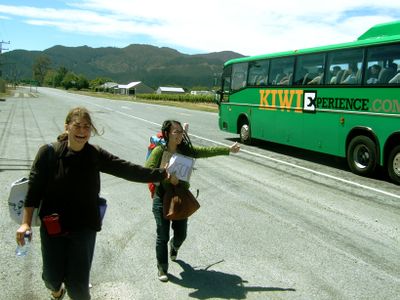New Zealand
| Information | |
| Language: | |
| Capital: | Wellington |
| Population: | 4,403,000 |
| Currency: | New Zealand Dollar |
| Hitchability: | <rating country='nz' /> |
| Meet fellow hitchhikers on Trustroots | |
| <map lat="-41.045886836287" lng="174.13183593748" zoom="5" view="0" float="right" /> | |
| Check out hitchhiking spots on Hitchmap | |

New Zealand is an extremely easy country for hitchhiking. There are a lot of friendly people, and hitching is legal and comparatively safe. By hitching you'll be involved a lot in local life. You'll receive invitations to parties and homes. Cars drive on the left side, so be careful if you're not experienced with that.
At least in high and shoulder season, hitchhiking is very popular among backpackers travelling around New Zealand, especially in the South Island. Leave early before hostel checkout times (usually 10am) and you'll have better chances of avoiding competition with other hitchhikers.
There are only motorways around the big cities, Auckland, Christchurch, Wellington and Dunedin, the rest are highways, secondary/tertiary roads or dirt roads.
Contents
In General
Another awesome place to travel, WWOOF and hitch. Not as many long distance rides as in the Australian Outback, because towns are quite close to each other, but on the other hand not as "dangerous" to hitchhike.
North Island or Te Ika-a-Māui
A bit smaller than the South Island, although much more populated: 3.5 million out of New Zealand's 4.5 million inhabitants. This island is a bit less touristy, but cities are bigger. Hitching is easy.
South Island or Te Waipounamu
The South Island is bigger but less populated, only 1 million, and is the most touristy so you will often be picked up by travelers, especially along the West Coast where there isn't a lot of local traffic. Hitching is extremely easy.
From one island to the other
The 3-4 hour ferry costs around NZ$50 - Interislander and Bluebridge have almost identical pricing. Since car bookings also incur a fee per person about the same as per foot passenger, cars won't be able to take you on, and grouping together wouldn't help either. You may get lucky and find a special discount on their Facebook page (or subscribe to their newsletters for a promo code), and there's always the usual 10% BBH/YHA/Student/...
Planes are more expensive with booking fees and luggage. But some very cheap prices come up on grabaseat for as little as $30 from Auckland to Christchurch! You literally can't hitch there for that.
Hitchhiking a boat would not be a simple task, the passage is not an easy one.
Maps
- [1] Topomaps for hiking etc with all tracks, contour lines etc - an online version of official and free LINZ maps
- [2] DOC maps with markup for tracks, huts and activities
- newzealand.com commercial tourism info
People
New Zealanders refer to themselves as "Kiwis", like the fruit or the flightless bird. The indigenous people of New Zealand are the Māori, who make up 17% of the national population. They have their own unique culture and customs, totally different to the Pākeha (white) population. One of these that may concern a hitchhiker is the "Hongi", the traditional greeting. Many Māori, especially the elders prefer this to shaking hands. Basically, it is pressing the nose and forehead together with the other party. Don't be afraid or confused, it is acceptable for people who are not Māori to perform this, in fact it is welcomed! Many Kiwi's like to say "Kia Ora" (Kee-Or-rah) instead of hello in English. It means hello but in Te Reo, the language of the Māori. Using this will endear you to the Kiwis. In general, avoid from discussing race relations, the Treaty of Waitangi, Covid-19 or politics with Kiwis as these are touchy subjects. You will meet more Māori in Northland and the East Cape, travel to these regions for an interesting cultural experience!
When?
Summers start in October/November but being a maritime climate the weather can be changeable. The weather in January - March is a little more settled.
Winter can be harsh and snowy, keep this in mind when planning your trip. The general snowy season is about early June until early October in the South Island/central North Island. Gloves, scarf and hat are definitely a good idea.
Other travelling info
Look at the Nomadwiki article for more, but free camping ("freedom camping") has recently become a huge issue and can expose you to a NZ$200 fine. Enforcement officers are very active in summer and it is best to find legitimate free camping spots provided by local councils or DoC.
North Island
- Auckland, biggest city
- Hamilton (New Zealand)
- Rotorua
- New Plymouth
- Palmerston North
- Taupo
- Tauranga
- Wellington, the capital city
- Whangarei
South Island
- Blenheim
- Christchurch
- Dunedin
- Invercargill
- Kaikoura
- Nelson
- Picton
- Queenstown
- Richmond
- Aoraki/Mt Cook
- Punakaiki
Personal experience
Nomadwiki & Trashwiki
Check Trashwiki for dumpsters...and share your wisdom :)